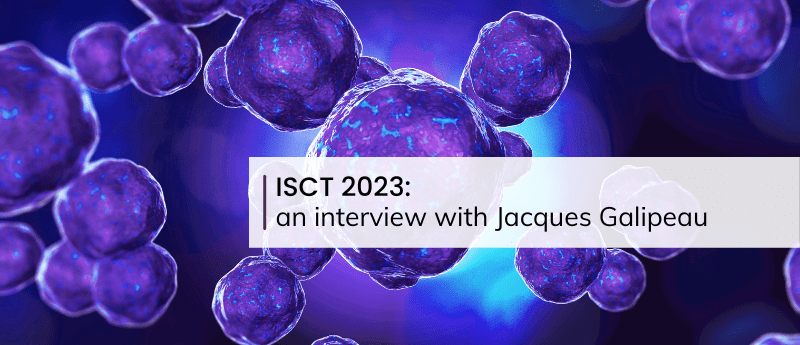ISCT: a pre-conference interview with Jacques Galipeau

 In advance of the International Society for Cell and Gene Therapy 2023 annual meeting (ISCT; 31 May-3 June; Paris, France), we spoke with Jacques Galipeau about what we can look forward to, how ISCT has expanded their roundtable plans from last year, and the developments that we can expect to see from the ISCT in the next year.
In advance of the International Society for Cell and Gene Therapy 2023 annual meeting (ISCT; 31 May-3 June; Paris, France), we spoke with Jacques Galipeau about what we can look forward to, how ISCT has expanded their roundtable plans from last year, and the developments that we can expect to see from the ISCT in the next year.
Please introduce yourself and give an overview of your role.
I am a practicing Hematologist and the Don and Marilyn Anderson Professor of Oncology at the University of Wisconsin-Madison (WI, USA), where I’m also Associate Dean for Therapeutics Development at the School of Medicine and I am the current President of the International Society of Cell Therapy (ISCT; Canada) with my mandate being from 2022 to 2024.
Which talk or session are you most looking forward to at the ISCT annual meeting?
Like a kid in a candy store! I’m not sure where to start. I very much look forward to the roundtables, which we added to the program last year for the first time, as they give the opportunity to be part of live conversations with thought leaders. Of course, the plenaries are a must-see. It’s going to be exciting to hear thought leaders speak to hot-button issues in the moment and, of course, have the opportunity to network.
This year’s program has a large focus on translation to the clinic. Can you give us a brief overview of the biggest challenges facing the translation of advanced therapies?
With cell-based therapies, you have all the complexities of dealing with a living therapeutic. The challenges right now are primarily in logistics and they were really highlighted during the COVID-19 pandemic. You have to consider things such as point-of-care manufacturing versus shipping these living therapeutics to the patient. And while we’ve been doing bone marrow transplants for the past 50 years, and we’ve been shipping cells around the world for the past quarter century, those cells are minimally manipulated and, therefore, in a way, they are quite forgiving. In comparison, genetically enhanced cells have been traumatized, making them much more delicate to ship.
There is also the regulatory and quality assurance aspect, which is trying to catch up. As soon as you change the characteristics of the cells, for example, by genetically manipulating them, the therapeutic is now regulated like a drug. And employing this regulatory template for living therapeutics doesn’t work very well. The living therapeutics we’ve been dealing with in medicine for a long time ̶ kidney transplant, cornea transplant, bone marrow transplant etc., ̶ aren’t regulated like drugs. But cell therapies are. There is also a lot of heterogeneity between the different regulatory environments internationally.
What is the main message you would like attendees to take away from the conference with regard to translation?
Well, from a translation perspective, 10 years ago the considerations of translation were all theoretical. But now they are reality-based and occurring in real time.
The message I would like to convey to our attendees is that I feel that the old rules that applied for medicinal chemistry are maladapted for the deployment of living therapeutics. So, I would invite people to have a fresh perspective rather than being tied up by the rules and trying to navigate them. I think we need to be bold and present novel, creative, practical remedies for the sustainable deployment of these technologies.
ISCT 2022 saw the addition of roundtable sessions to the program for the first time. What benefits did you see from this and how are roundtables being included in this year’s program?
It’s a format we beta-tested last year in San Francisco; it was a gigantic hit. It’s really the absence of scripting that makes it so attractive. You can get really engaged audience participation and it gives greater space for critical conversations to take place. It’s an exciting time in the industry because things are growing and we don’t know what we don’t know. That’s the beautiful thing about where we are in our space ̶ it’s uncharted territory and nothing is set in stone.
What developments can we expect to see from the ISCT in the next year?
A huge initiative from ISCT is focusing on workforce development. Due to the Cambrian explosion we’ve seen in the development of novel living therapeutics there is a great need for expertise, for example, in the cell processing, regulatory environment, quality assurance, discovery, post-marketing approval, tracking, etc., I could go on forever really. We at the ISCT are positioned to be thought leaders in the cell and gene therapy space and we have a long track record of excelling at knowledge transfer. So now we can leverage those things to provide useful, practical materials for workforce development.
Disclaimer
The opinions expressed in this interview are those of the interviewees and do not necessarily reflect the views of RegMedNet or Future Science Group.